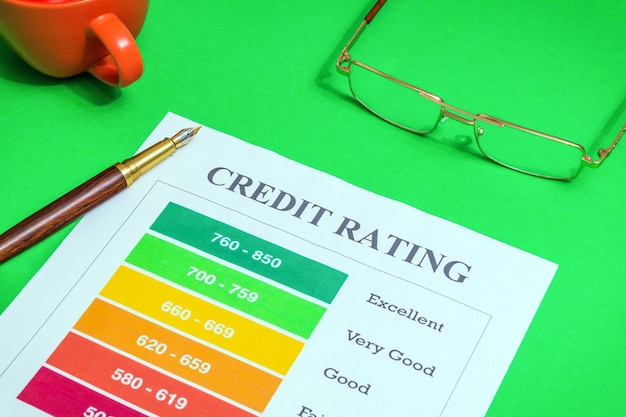Spotting Errors in Your Credit Report: Why It Matters for Lower Interest Rates
Understanding the benefits of a good credit score is like having a secret weapon in your financial toolbox. It opens the door to lower interest rates on loans and makes big purchases like homes more attainable. But did you know that errors in your credit report can hold you back from reaping these rewards? Many people are surprised to find inaccuracies that can affect their credit rating, costing them money. Let’s explore how spotting these errors can improve your financial health and smooth the loan approval process, setting you on the path to better opportunities and peace of mind. For more information on common credit report errors, check out this resource.## Importance of Good Credit

Good credit is essential for maintaining financial health and achieving long-term financial goals. It influences everything from interest rates to loan approvals, making it a crucial element of personal finance.
Credit Score Benefits
A high credit score can lead to substantial savings and opportunities. Lower interest rates on loans and credit cards are one of the primary benefits, reducing the overall cost of borrowing. With a good credit score, you can also enjoy better terms on financial products, increasing your financial flexibility.
Moreover, landlords and employers often consider credit scores during the application process. A strong score can increase your odds of securing desirable housing or employment. Additionally, some insurance companies offer lower premiums to individuals with high credit scores, potentially saving you money on essential services.
In essence, the benefits of a good credit score extend beyond just financial savings. It opens doors to more favorable terms and opportunities, helping you to build a stable and secure financial future. For more insights, visit Earnest.
Impact of Good Credit
The impact of good credit reaches into various facets of life. It can significantly influence your capacity to make large purchases, like homes or vehicles, by providing access to better financing options.
For instance, securing a mortgage with a low interest rate can save you thousands of dollars over the life of the loan. This can make homeownership more attainable and affordable. Similarly, when financing a car, a good credit score can mean lower monthly payments, allowing for more manageable budgets.
Beyond purchases, a good credit score instills confidence in lenders, landlords, and employers, enhancing your reputation and credibility. This trust can be instrumental in personal and professional relationships, giving you a competitive edge in various situations.
Ultimately, maintaining good credit is a strategic move that pays off in numerous ways, fostering both financial security and broader life opportunities.
Common Credit Report Errors

Credit report errors are surprisingly common and can negatively impact your credit score. Identifying and fixing these errors is crucial for maintaining good credit health.
Identifying Errors in Credit Report
To effectively manage your credit, it’s essential to regularly check for errors. Common inaccuracies include incorrect account information, outdated data, and inaccurate payment histories. Identifying these errors requires a detailed examination of your credit report.
Start by obtaining a copy of your credit report from all three major bureaus. Compare the information across reports to spot inconsistencies. Pay close attention to account balances, credit limits, and payment records.
If you find errors, document them carefully. Keeping detailed records can assist in any disputes with creditors or credit bureaus. For a comprehensive guide on identifying errors, visit Certified Credit.
Awareness is the first step in protecting your credit score. By being proactive, you can correct mistakes and prevent them from affecting your financial health.
Loan Approval Process
Errors in your credit report can complicate the loan approval process. Lenders rely on this information to assess risk and determine loan terms. Inaccuracies can misrepresent your creditworthiness, leading to higher interest rates or denial of applications.
During the loan approval process, lenders scrutinize your credit history. Any discrepancies can trigger doubts, causing delays or rejections. Ensuring your credit report is accurate helps streamline this process, increasing your chances of approval.
To safeguard your loan prospects, regularly review your credit report and rectify any errors promptly. Understanding how these mistakes can impact your application is vital. For more details on rectifying errors, check CNBC.
By addressing credit report errors, you can better navigate the loan approval process, securing favorable terms and conditions.
Steps to Improve Credit

Improving your credit score is a proactive process that demands attention and dedication. By implementing strategic actions, you can enhance your creditworthiness over time.
Improve Credit Rating
To improve your credit rating, focus on these key strategies:
Pay bills on time: Consistency is crucial; missed payments can significantly damage your score.
Reduce debt: Aim to lower your credit card balances and other outstanding debts.
Avoid new credit inquiries: Limit applications for new credit accounts to maintain a stable credit profile.
Additionally, regularly monitor your credit report for errors and disputes. Correcting inaccuracies can swiftly enhance your score. For more comprehensive guidance, explore Consumer FTC.
By taking these steps, you can effectively improve your credit rating, paving the way for better financial opportunities and lower interest rates.
Financial Health Tips
Maintaining good financial health involves more than just a strong credit score. Here are some tips to ensure overall financial stability:
Create a budget: Track your income and expenses to manage your finances effectively.
Establish an emergency fund: Save for unexpected expenses to avoid credit reliance.
Invest wisely: Consider investing in retirement accounts or other financial instruments for future security.
By incorporating these practices into your financial routine, you can enhance your financial health and resilience. A holistic approach to finances not only supports a good credit score but also ensures long-term financial stability and peace of mind. For additional insights, visit CNBC.


0 Comments